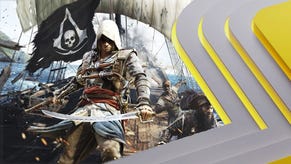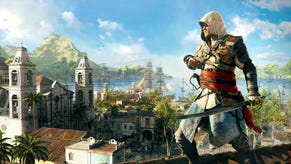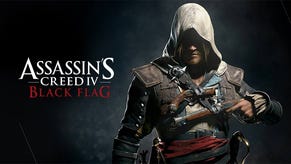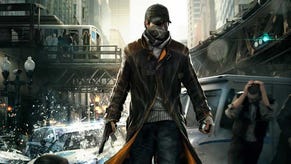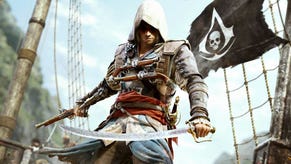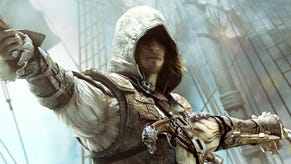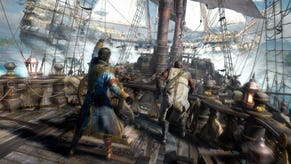Assassin's Creed 4: Black Flag PS3 Review: Better Than AC3?
Does Ubisoft newest Assassin's Creed learn from the sins of its predecessor?
This article first appeared on USgamer, a partner publication of VG247. Some content, such as this article, has been migrated to VG247 for posterity after USgamer's closure - but it has not been edited or further vetted by the VG247 team.
Mike Williams, Primary Reviewer
So here we go, Ubisoft chance to prove to fans that they learned from the disappointing Assassin's Creed III. That game was full of good ideas hampered by poor execution, wrapped in a story that started very slow and sprinted towards an unsatisfying finish. Assassin's Creed IV: Black Flag is a chance for Ubisoft to show that they acknowledge what went awry before and prove they've used their year of development to create a better experience.
Black Flag drops you in the shoes of Welsh pirate Edward Kenway, who immediately struck me as a more charismatic personality compared to his stoic grandson, Assassin's Creed III's Connor. Like Connor, Edward's motivations are clear, but unlike Connor his motivations drive the story forward. Edward's quest for riches made him to become a pirate and they've landed him right in the middle of the age-old war between the Assassins and Templars. Early on, Edward isn't really on any side except his own; he's honorable to a point, but coin is what pushes him forward, not his conscience.
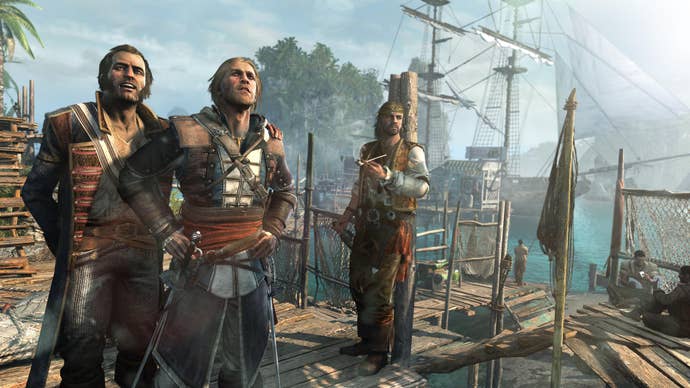
The story doesn't necessarily fare as well, but it's a passable effort. It gets Edward from point A to point B, but Black Flag's real strength is in Edward and his supporting cast. Blackbeard and James Kidd are among the standouts, but the rest do a great job as well. Even wrapped in byzantine machination upon machination, the characters shine through.
Speaking of characters, one of the standouts in Black Flag are the Templar Hunts missions, which put you in contact with the lead assassins in certain regions. I loved all of these folks. Every single one is interesting; I did their missions just to keep having Edward interact with them.
One thing Ubisoft did learn from Assassin's Creed III is skipping a lengthy opening tutorial section. Black Flag drops you right in action and within 15 to 20 minutes, you're ready to do whatever you want on the high seas. Some of the actions lack context since you haven't gotten to the story bit that fully explains them, but you're certainly allowed to play around. I freed pirates from guards without a crew to send them to and pillaged a fort long before the game led me there by the hand. Black Flag will still be teaching you new stuff into Sequence 6, but there's far more you can do before that.
And Black Flag is one big ass open-world with a ton of things to do. Take over forts, raid plantations, dive, hunt, harpoon, collect treasure, shanties, and animus fragments, find Mayan ruins, fight ships; it's all up to you. There's a ton in the game to do and it will take you a very long time to do it all if that's your desire. Black Flag is very clear about the context of all your actions - Edward's got to get paid - but it doesn't force it down your throat. If you want to, you can just sail.
And open-world sailing works. I fought some ruffians at a tavern, killed two guards, ran to my ship with more chasing me, and set sail, leaving them behind. When you make sense of all sailing provides, it actually maps rather well to existing Assassin's Creed systems. Forts on the high seas are just like ACIII's forts on land. In restricted areas, there are ships with vision cones that you either avoid or fight. What Black Flag does well is give you a sense of freedom, on land or on sea. It's not as crazy and free-for-all as Grand Theft Auto's shenanigans, but you definitely feel like your choices are yours.
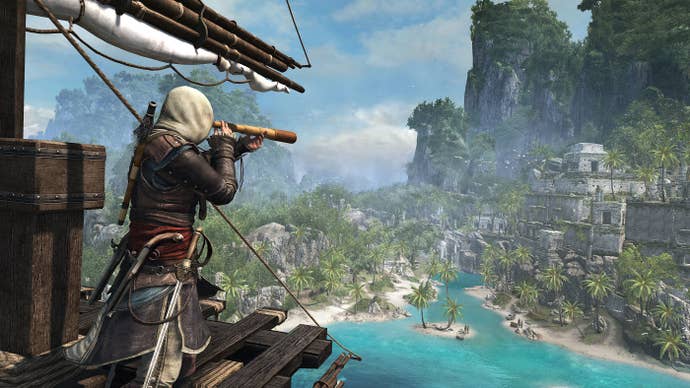
Black Flag features three different primary cities, Havana, Nassau, and Kingston, each with their own distinct look and feel. Oddly enough, the cities feel like gameplay callbacks to other Assassin's Creed areas: Havana reminded me of Liberation's New Orleans, while Nassau feels like the shorter, squatter buildings of Assassin's Creed III. There's a sense that more care was taken in providing more routes in the cities: buildings and trees seem to link far more seamlessly than in ACIII. The level design branches out into some very interesting areas when you head out into the world, with ruins and jungles providing some fun areas to explore.
Crafting is back with a new hunting system stolen shamelessly from Far Cry 3. Upgrades are either meant for Edward or his ship, the Jackdaw. Hunting or harpooning animals provides you with materials for Edwards upgrades, including holsters and armor upgrades. Taking down ships on the sea nets you cloth, wood and metal for Jackdaw upgrades like bigger cannons, mortars, battering rams, and crew quarters.
If you've noticed, I haven't really dug into combat and missions, but that's because Black Flag is an evolution for the series, not a revolution. Missions still have you tailing enemies, eavesdropping on them, outright killing them, or reaching certain points without being seen. Eavesdropping missions aren't stuck to a single, set path as they were in ACIII, though the old pass-fail horrors still rear their heads from time-to-time. Combat is still based around countering, breaking defense, and kill chains. Enemies are more likely to try to break your chains this time around, but if you're always ready to counter, it's not much of a problem.
The core of Assassin's Creed remains largely the same in Black Flag, but Ubisoft has made some quality-of-life changes. Lasting notoriety is completely gone on land: once you've run far enough and hidden, guards won't remember that suspicious guy who stabbed Antonio. Notoriety is a thing on sea, but you can simply bribe officials to clear your wanted level. Focusing on targets with Eagle Vision now marks them, allowing you to see them through all obstacles. No, it doesn't make sense, but it is useful.
The fast travel system from Assassin's Creed III's cities has been killed entirely. (Praise be!) Synchronization points return in full force and they're everywhere. The new fast travel system allows you to return to any synch point you've been to. Are you in Nassau, but your mission is in Havana? Bring up the map, zoom into Havana, and pick the synch point closest to your objective. You can go right there. It's enormously useful. You can still explore, but sometimes you just want to get back to somewhere quick. Thank you, Ubisoft.
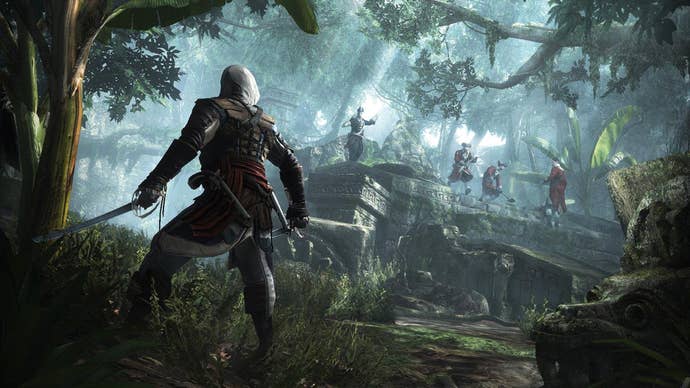
And for the collectible hounds, there's a display card for each region that shows all the collectible items and synch points in the area, so you know if you're missing anything. As a completionist when it comes to AC, I appreciated the addition.
The Brotherhood is gone, which is probably good from a gameplay perspective, but the extra Brotherhood missions are now taken up by Kenway's fleet. When you attack and board a ship, you can choose to add that ship to your fleet. The fleet can then be sent on missions across the Atlantic and you can also participate in ship battles to make trade routes safer.
While this can be controlled in-game, I actually found it easier to use the Assassin's Creed IV companion app on my Nexus 7. The app has a real-time map, your treasure maps, a progression tracker, the Animus database, and your fleet. The other options are nice, but I didn't use them much. I found myself using the fleet controls frequently. I connect on WiFi, see what my fleet has done in the last few hours, repair them, and send them back out. It's really useful and if you have the option, I'd at least try it.
The modern day briefly pops up again, putting you into the game as a nameless, faceless Abstergo Entertainment employee searching through Edward's life so it can be turned into a television show. These parts are pretty short if you don't want to participate, but there's still a great deal of content there and some old favorites return.
Assassin's Creed IV: Black Flag is one of the best-looking AC titles to date. The Caribbean is a brighter canvas than the American Colonies. I played on PlayStation 3 and some vistas are absolutely amazing. The water in shallow shores makes me want to a take a Caribbean vacation, and the water engine gets a big workout in storms. I've played the PlayStation 4 version in previous demos, but the difference is in the details there: more impressive water, dynamic vegetation, better lighting, better textures, and other particle effects. You probably won't want to go back after playing the next-gen Assassin's Creed, but the current-gen still looks great on its own.
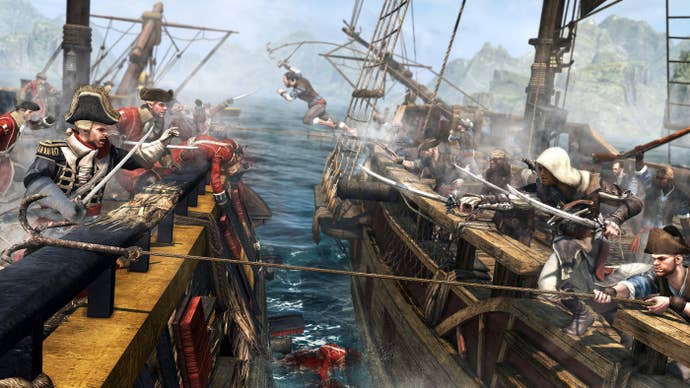
Assassin's Creed IV: Black Flag is equal parts ambitious and familiar. The open-world and full integration of the naval system takes the series in a new direction, but its core remains exactly the same. Stealth is a bit better, but that's not the game's main focus, and really hasn't been for a long time. What it does well is evoke that pirate feel, that sense of freedom and exploration. Sailing your ship narrowly past a sentry or pushing onward in a deep fog is as exhilarating as leaping from tree, to building, to air assassination.
Did Ubisoft learn? Yes. The jump from Assassin's Creed III to Assassin's Creed IV: Black Flag is equal to the jump from Assassin's Creed to Assassin's Creed II. I can only hope Ubisoft's next Assassin's Creed is the next Brotherhood. Either way, it's the best damn pirate game ever, so if that's your thing, the buck stops here.
- Visuals: The graphics are amazing and the level design is top-notch. If you take the time to explore, you'll find stuff that will drop your jaw.
- Music: The soundtrack really gets going on the open sea, with some great Irish pirate ballads. I'd buy the soundtrack separately.
- Interface: The new UI is smoother than the one in previous games and the new weapon choosing system is worlds better.
- Lasting Appeal: There is a ton to explore and collect in Assassin's Creed IV. The story is lengthy on its own, but if you want to find everything, you'll be playing for awhile.
ConclusionAssassin's Creed IV: Black Flag is an evolution for the series, not a revolution. It's a gorgeous game that learns from the disappointing Assassin's Creed III and the addition of the naval open world is a triumph. If you're tired of the formula, there might be enough here to bring you back into the Order.



